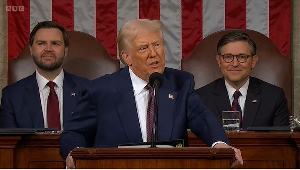Accra, Aug. 23, GNA - The agriculture sector has performed relatively well in the past six years, with growth rising from 2.1 per cent in 2001 to 6.5 per cent in 2006.
Additionally, Ghana has been identified by the UN Food and Agriculture Organization (FAO) as the only country south of the Sahara that had already reduced hunger by 50 per cent, 10 clear years of the mandate of the Millennium Development Goals (MDGs) enjoining all countries to strive to reduce hunger by 50 per cent by 2015.
Food and Agriculture Minister Ernest Debrah, who disclosed this at the launch of this year's Farmers' Day Celebration in Accra on Thursday, said the country was now self-sufficient in the production of many of its staple foods including cassava, yam, maize and plantain. He said a lot more was being done to increase growth in the sector and to achieve self-sufficiency in rice, meat and fish production, adding that these were achieved through the hard work of farmers and fishermen who deserved to be properly recognized and acknowledged. The National Farmers' Day is an annual event celebrated in all the regions and districts and is designed to honour deserving farmers, fisher folks and those who directly or indirectly contribute to agricultural development.
This year's celebration, which is the 23rd since its inception, is under the theme: "Ghana at 50: Progress and Challenges of Sustainable Agricultural Development". It is scheduled for December 7 with the venue for the national event yet to be decided between the Upper East and the Northern regions.
Mr Debrah noted that despite landmark achievements, the Ministry's efforts to create an environment for sustainable growth and development in the agricultural sector was constrained by numerous challenges.
These include the land tenure system, over-reliance on erratic rainfall, inadequate marketing and post-harvest management, poor access to improved inputs, limited financial services, inadequate mechanization services, low use of modern technologies and the non-participation of the youth in agriculture.
Despite these challenges, he said, farmers had made it possible for the country to enjoy relative food security, adding that the Ministry was determined to accelerate growth in the sector.
MOFA, the Minister said, had just revised the Food and Agriculture Sector Policy (FASDEP) to meet these challenges and transform the economy where modernized agriculture would culminate in improved food security, increased employment opportunities and significant reduction of poverty, particularly in rural areas.
FASDEP II aims to modernize agriculture to provide the critical linkage between the sector and industry, based on the application of science and technology and sustainable land management and environmental practices.
Mrs Gladys Asmah, Minister of Fisheries, said Ghanaians since independence had paid lip service to agriculture and fish farming hence the under-development in these sectors which had led to poverty, especially in the rural areas and fishing communities. According to her, a lot had, however, happened since 2005, as government had laid foundations for the modernization and revamping of the farming sector and fisheries industry in the form of improving infrastructure.
She noted that the challenge was how to replace the ageing farming and fishing population with young and educated people and the stimulation of investment into the fisheries industry, especially in the aquaculture arena.
She held that, adding value to agricultural produce was the answer to sustainability in the sector.
Mr Isaac Osei, Chief Executive Officer of the COCOBOD, said for Ghana to mitigate the challenges of sustainable agricultural development, it needed to encourage greater value addition to local agricultural production through modernizing and mechanizing the sector. Thus the main goals of sustainable agriculture should focus on farm profitability, prosperous farming communities and good environmental stewardship, he said.
Mr Paul Koranteng, Board Chairman of the Agricultural Development Bank, who launched the celebration, called on corporate bodies as well as individuals to contribute massively to show appreciation to farmers and fishermen for their work of ensuring food security and to make this year's event better.
The ADB would provide a three-bedroom house for the Best Farmer as well as sponsor the welcome cocktail for all winners for this year. Crocodile Machetes have also pledged 50 million cedis worth of the machetes and 10 million cedis cash towards the celebration. Zoom Lion, a waste disposal company, has donated two motorized tricycles and pledged to provide a dustbin and a year's waste disposal for the Best Farmer.
General News of Thursday, 23 August 2007
Source: GNA
















